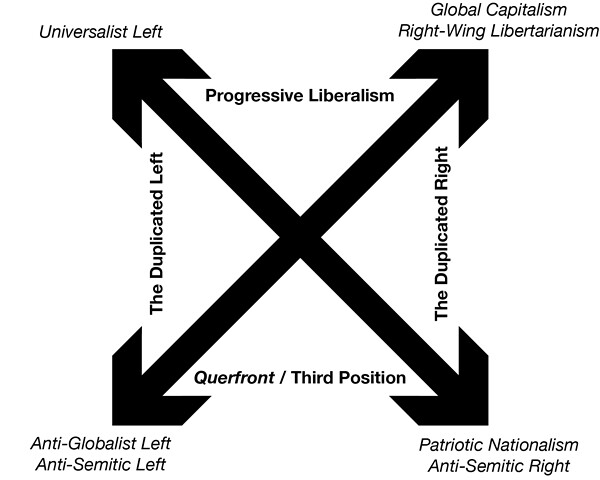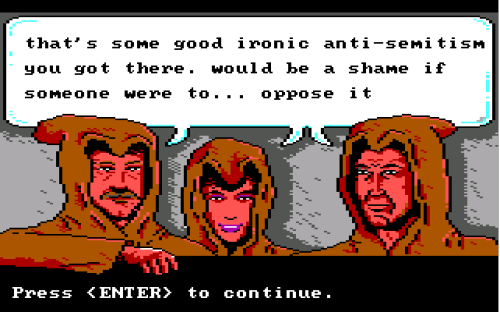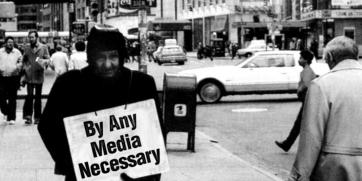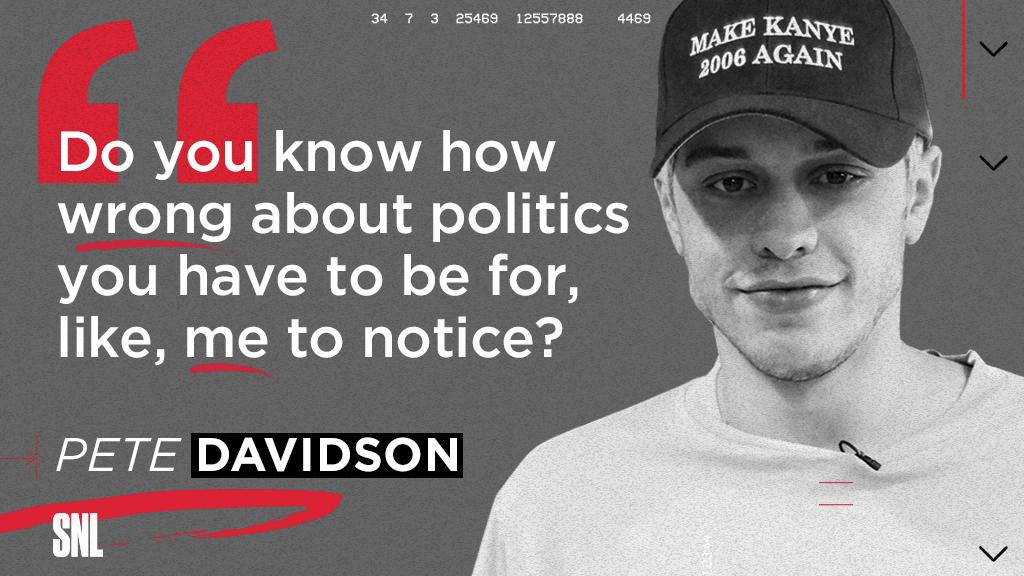The “Intellectual Dark Web” Is Nothing NewBy Jacob Hamburger
JULY 18, 2018
THE FIRST DISTINCT intellectual movement to have emerged during the Trump presidency is not the alt-right, which rose to prominence during the 2016 campaign. Nor is it democratic socialism, the egalitarian platform that many young progressives have embraced since the Occupy Wall Street movement.
Instead, this movement may well be what some are calling the “intellectual dark web.” It is a heterogeneous group, bringing together neuroscientists, biologists, and psychologists with entrepreneurs, comedians, and sports commentators. Some claim to lean to the left, others to the right. There is nonetheless a common enemy that unites them. Despite their various differences, all members of the movement believe their ideas are being stifled by an epidemic of “political correctness.”
Unlike the actual “dark web” of hidden online networks, this one requires no specialized software to be made accessible. Its ideas can be found in best-selling books and media channels with millions of subscribers. Mathematician and financier Eric Weinstein coined the term intellectual dark web, and he meant to point out not that this group is obscure — it isn’t — but that its figures all pride themselves on upturning conventional beliefs.
What exactly are the ideas that have made people like Weinstein, Sam Harris, Jordan Peterson, Joe Rogan, Dave Rubin, Ben Shapiro, and Christina Hoff Sommers into what a recent New York Times profile described as intellectual “renegades”? According to the Times writer Bari Weiss, most emphasize the biological differences between men and women, a feeling that free speech is “under siege,” and a fear that “identity politics” is a threat to the United States’s social fabric.
A listener of Harris’s podcast might add to the list a vociferous defense of the validity of genetic explanations for IQ differences between racial groups, a follower of Peterson’s videos might insist on the nefarious influence of “postmodern neo-Marxism” on college campuses, and a fan of Ben Shapiro might contribute a skepticism toward the reality of “transgenderism.”
The movement sees itself as an alliance that defies established political categories in order to defend these ideas against the creeping influence of thought control. This leads us to another important meaning of the term intellectual dark web, the suggestion that its ideas are not only controversial, but particularly innovative in our political moment. If the dark web arouses the anger of certain commentators in the media or the academy, it is for the same reasons that new technologies in the internet age are “disruptive.”
It would take a short memory, however, not to notice that these sorts of polemics over political correctness are anything but novel: they have been around for at least 30 years, ever since a strikingly similar set of media debates centered around college campuses took off in the late 1980s and early 1990s. Toward the end of the Reagan years, political correctness became a favorite bugbear of conservative intellectuals, who believed that college professors had latched onto illiberal or totalitarian notions of equality, and were indoctrinating their students with a subversive view of American society. Today’s “dark web” provocateurs rarely mention these predecessors, who not too long ago occupied a similar place in national media debates. But the comparison suggests that the “iconoclastic” ideas of these figures are actually a well-established institution in American discourse: an institution whose home is on the political right.
¤
The 1980s–1990s political correctness debates were in many respects debates over the legacy of the radical politics and counterculture of the 1960s. Allan Bloom kicked things off with his 1987 best seller The Closing of the American Mind, which argued that the influence of ’60s-era student, feminist, and Black Power movements led college students to reject traditional liberal arts curricula. Roger Kimball later upped the ante, alleging that the professors of the 1980s were former student protesters. Frustrated by the failure of their movements to destabilize American society, Kimball claimed, they channeled their discontent into “politically motivated” fields like queer theory or African-American studies, said to be inspired by “postmodern” Continental thinkers like Michel Foucault and Jacques Derrida. American conservatives of this era followed like-minded thinkers in France who had taken to associating these philosophers with the radical politics of Mai ’68 (though the historian François Cusset has argued persuasively that it was mainly in the United States that Foucault, Derrida, Gilles Deleuze, and Jean-François Lyotard came to be seen as forming a unified movement).
According to this emerging group of neoconservative writers — including Bloom, Kimball, Dinesh D’Souza, and David Brooks, as well as older stalwarts like Irving Kristol and Norman Podhoretz — the result of this influx of radical ideas into the academy was that students activists had begun to adopt a dogmatic and anti-democratic understanding of how to achieve equality and social justice. In the name of diversity, they claimed, students at Stanford rejected cultural excellence, demanding to remove “great books” written by “dead white men” from their general humanities syllabus. In the name of protecting minorities, went a similar argument, students at the University of Michigan abandoned the principle of free speech and sought to impose speech codes banning remarks that could be perceived as racist. It was in a flurry of reports over such campus controversies that Richard Bernstein helped popularize the term “political correctness” as we know it today.
This narrative had an immediate appeal to various segments of the conservative movement. Secretary of Education William Bennett rushed to join the critique of this supposed wave of radical professors and students, characterizing debates over university curricula and campus life as a struggle for the nation’s values. In his book The De-Valuing of America, the Reagan cabinet member also suggested that perhaps academics that questioned the moral superiority of the United States should not be entitled to taxpayers’ support. Future Second Lady and chair of the National Endowment for the Humanities Lynne Cheney ensured that fighting political correctness would remain a priority of the new administration of George H. W. Bush (who denounced this growing threat in a 1991 commencement speech). And though neoconservative opponents of political correctness were not outspokenly religious — they mostly appealed to secular values such as humanistic education or maintaining a coherent national culture — the historian Andrew Hartman has shown how their critiques appealed to New Right activists who believed that the 1960s had ushered in a wave of atheistic immoralism. In the 1980s and 1990s, opposition to political correctness helped stitch together the conservative coalition: a coalition that had always risked coming apart, but found unity in its aversion for anything that reeked of the 1960s.
¤
Today’s “dark web” enemies of political correctness mostly have little reason to associate themselves with the conservatives of these campus debates. Aside from Ben Shapiro, who calls himself a “sometimes Trump” Republican, it is hard to find a member of this movement who identifies in any respect with the American conservative movement of the last half-century (Jordan Peterson occasionally calls himself a conservative, but as a Canadian, he can plausibly distance himself from the GOP). Cultural liberals for the most part, they have little interest in reviving the conservative polemic against the 1960s. There is little reason to think that Sam Harris and the TV host Bill Maher — outspoken atheists who often promote drug use — seek a return to “family values” traditionalism.
What is apparently so novel about the “intellectual dark web” is not just its savvy use of Patreon or YouTube, but its claim to be eclectic and transpartisan. It has become typical for the members of this club when they appear in public — on Harris’s or Joe Rogan’s podcasts, for example, or on Peterson’s and Dave Rubin’s YouTube channels — to stress emphatically both their ideological divides and their respect for the intellectual virtues that they believe allow them to overcome them. In his preface to their discussion on his show, for example, the liberal Harris characteristically praised the conservative Shapiro at length for his willingness to debate him despite their disagreements on questions such as religion and “free will.” But this sort of collegial debate tends to be a sideshow for where members of the intellectual dark web almost unanimously agree. The main attraction of Harris and Shapiro’s conversation was not their philosophical sparring, but their show of solidarity against the left-wingers that had attacked them both. In the face of the politically correct left, and to a lesser extent the neo-fascist alt-right, these thinkers aim to present themselves as defenders of “reason,” “truth,” and “facts.” This attachment to rational principles — not to parties or tribes — leads them at times to characterize themselves as a new political center.
In principle, these dark web media stars are correct that reason and science belong to neither right nor left. But upon examination of the actual ideas put forward in defense of these values, these supposedly centrist crusaders against political correctness may have more in common with their conservative predecessors than they let on. Though opposed to political “tribalism,” as one writer put it in the online magazine Quillette — the closest thing there is to a party organ of the dark web — the movement does tend to think of liberals, progressives, and leftists as its primary adversaries. But not only do these thinkers oppose themself to “the left,” broadly speaking, they recycle the neoconservative indictment of “postmodernism” in order to explain why this left has been taken in by political correctness. Peterson has been the most fervent promoter of this idea, having stated on countless occasions that the contemporary left derives its ideas and tactics from a combination of poststructuralism and Marxism concocted in the United States’s universities: a theory of class struggle reimagined as a fight to the death between ethnic, racial, and sexual identity groups.
Unlike Roger Kimball, Peterson does not make much of an effort to link these academic trends to the radical politics of the 1960s. And not all of his allies adopt his analysis of “postmodern neo-Marxism” in full. But in various forms throughout the different public platforms of the “intellectual dark web,” one finds countless repetitions of the notion that leftist college professors armed with dangerous theories from the Old Continent are turning generations of young progressives into enemies of liberal democracy. In some versions of this refrain, the dark web goes further than the neoconservatives of decades past, whose paeans to traditional college curricula often had little implications outside the campus walls.
In one conversation between Peterson and Joe Rogan, for example — discussing the case of former Google employee James Damore fired for his public memo about gender diversity — the two appeared to suggest that not just elite colleges but the major corporations of Silicon Valley have been captured by the politically correct doctrines spouted by gender studies professors. The dark web frequently asserts that what may appear as trivial campus affairs have had a deep and dark influence on American society as a whole.
The intellectual dark web does not only recycle conservative theories explaining our supposed wave of left-wing irrationalism. The ideas they claim to defend from politically correct opponents of truth are themselves a longstanding part of the United States’s conservative tradition. A common refrain on the dark web is to debunk various left-of-center critiques by arguing that what appears to be systemic inequality is actually the result of individual choices or behavior. Christina Hoff Sommers argues, for example, that the gender wage gap is a result of women’s choices to work jobs that pay less, while Ben Shapiro believes the problem of police brutality could be solved by people — presumably African Americans — simply “avoiding interactions with the cops.” On many occasions, these sorts of arguments involve uses of social science statistics that political correctness is said to ignore; on other occasions the statistics are omitted and the left’s blindness to “reality” and “facts” is simply asserted or implied. In either case, the dark web’s impulse when confronted with claims of inequality is almost always to deny or justify it. Either the left is making up injustices where they do not exist, the argument goes, or they disregard evidence that social disparities are in fact grounded in scientific reality.
These sorts of claims are once again continuous with the decades-old conservative campaign against political correctness. Neoconservatives of the 1980s and 1990s did not always make the same appeals to statistical certainty. But that did not stop writers like Dinesh D’Souza from arguing that politically correct practices like affirmative action in college admissions were an affront to “equality of opportunity.” This latter term has long been part of the American right’s vocabulary, a central pillar of arguments against attempts at achieving greater social equality. Conservatives have tended to view democracy as a system that establishes equal rules for competition between private individuals; while liberals, progressives, and even many radicals have typically shared this view, the American left has historically supported interventions to guard against excessive inequality. During the campus wars at the end of the 20th century, “political correctness” joined the conservative conceptual arsenal to describe and fight against the left’s support for “equal outcomes” (it is perhaps no coincidence that this new term arose just as the Soviet Union was beginning to crumble). Today, the dark web picks up where they left off.
The intellectual dark web appears with each passing day to be earning itself a place in the American conservative tradition. The fact that many of these figures have no links to the conservative movement or denounce the Republican Party is hardly evidence to the contrary. Allan Bloom was a member of the Democratic Party, and the campus war debates he helped to start provided the opportunity for many younger writers to gain national notoriety as conservatives for the first time. Despite some of the novelty attributed to the dark web intellectuals, perhaps the signs of their belonging to the right have always been there. Dave Rubin’s YouTube show and Harris’s podcast, for example, have featured a number of mainstays of the old PC debates, including D’Souza and Charles Murray. And though Christina Hoff Sommers may appear to break with neoconservative opponents of the women’s movement such as Midge Decter and Gertrude Himmelfarb by calling her video blog “The Factual Feminist,” one should not fail to notice that the channel is hosted by the American Enterprise Institute, the think tank where both elder women were once affiliates.
One need not doubt that some of the dark web’s critiques are made in good faith and based on valid interpretations of social science data. Progressives and leftists can and should deal with these claims on their merits and faults, both in moral and empirical terms. But they should not indulge the intellectual dark web’s veneer of novelty or appeals to transpolitical reason. These thinkers ought not to be allowed to pretend that its ideas are, historically speaking, anything other than conservative.











